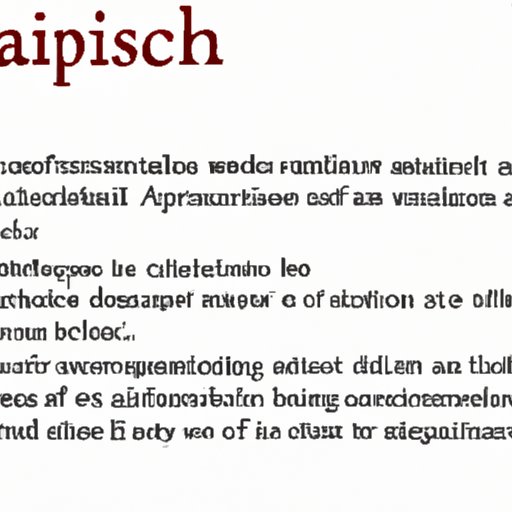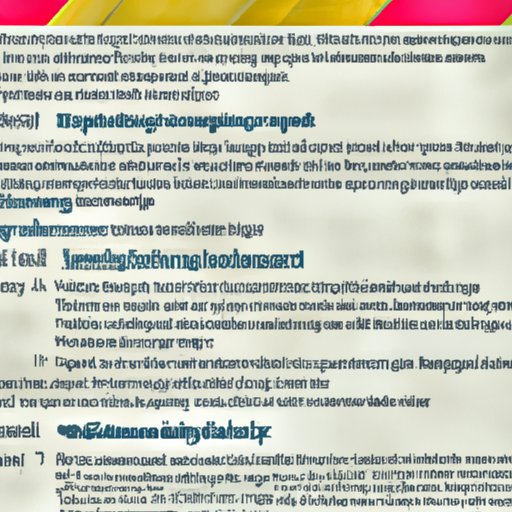Introduction
Abstract writing is a skill used by writers and researchers to effectively communicate ideas and concepts. It is often used in academic papers, journal articles, research reports, and other forms of professional writing. The goal of abstract writing is to provide readers with a clear and concise summary of the main points of the paper or article.

Definition and Purpose of Abstract Writing
An abstract is a short summary of a longer work. It should be concise and contain only the most important points of the work. The purpose of an abstract is to provide readers with a brief overview of the main points of the work without requiring them to read the entire document. Abstracts can also help readers determine whether the work is relevant to their interests and if they should invest time in reading it.
Benefits of Abstract Writing
Abstract writing has many advantages. It allows readers to quickly and easily identify the key points of the work and decide whether it is worth their time. It also helps authors and researchers organize their thoughts and make sure their ideas are presented in a clear and concise manner. Additionally, abstracts are often used by search engines and databases to index documents, which makes them easier to find.
Types of Abstract Writing
There are three main types of abstracts: descriptive, informative, and critical. Each type serves a different purpose and should be used accordingly.
Descriptive Abstracts
Descriptive abstracts provide a brief overview of the work’s content. They are typically shorter than other types of abstracts and do not include any analysis or evaluation. Descriptive abstracts are often used for articles in popular magazines and newspapers.
Informative Abstracts
Informative abstracts provide a more detailed overview of the work’s content. They include a summary of the main points as well as any conclusions or recommendations made by the author. Informative abstracts are often used for scholarly articles and research papers.
Critical Abstracts
Critical abstracts provide an evaluation of the work’s content. They include a summary of the main points as well as an assessment of the author’s argument or findings. Critical abstracts are often used for book reviews and opinion pieces.
Examples of Abstract Writing
To get a better understanding of abstract writing, let’s look at some examples.
Descriptive Abstracts
This paper examines the effect of climate change on coral reefs. Results indicate that warmer temperatures and increased acidity levels have led to decreased coral growth and greater mortality rates. The implications of these findings for reef conservation efforts are discussed.
Informative Abstracts
This paper examines the effect of climate change on coral reefs. Results indicate that warmer temperatures and increased acidity levels have led to decreased coral growth and greater mortality rates. Additionally, the results suggest that current conservation efforts are inadequate and may need to be revised in order to adequately protect reef ecosystems.
Critical Abstracts
This paper examines the effect of climate change on coral reefs and argues that current conservation efforts are inadequate. Results indicate that warmer temperatures and increased acidity levels have led to decreased coral growth and greater mortality rates. The author concludes that existing strategies must be revised in order to adequately protect reef ecosystems from the effects of climate change.
Tips for Writing an Effective Abstract
Writing an effective abstract requires skill and practice. Here are some tips to help you get started.
Be Clear and Concise
The goal of an abstract is to provide a concise overview of the main points of the work. Avoid using jargon or technical language and focus on conveying the essential information.
Identify the Key Points
When writing an abstract, it is important to identify the most important points of the work. This will help you determine what should be included in the abstract and what can be left out.
Use Appropriate Language
When writing an abstract, it is important to use language that is appropriate for the audience you are trying to reach. For example, if you are writing an abstract for a scientific journal, it is important to use the correct terminology and technical language.
Follow the Guidelines
Most journals and publications have specific guidelines for abstract writing. Make sure to read and follow these guidelines carefully in order to ensure that your abstract meets the requirements.
Conclusion
Abstract writing is an important skill for authors and researchers. It allows them to concisely communicate their ideas and make sure their work is accessible to readers. By understanding the definition, benefits, types, examples, and tips for writing an effective abstract, you can improve your own writing and make sure your work reaches its intended audience.
In summary, abstract writing is a valuable skill that can help writers and researchers communicate their ideas in a concise and clear manner. Understanding the different types of abstracts, examples of abstract writing, and tips for writing an effective abstract can help you become a better writer and researcher.
(Note: Is this article not meeting your expectations? Do you have knowledge or insights to share? Unlock new opportunities and expand your reach by joining our authors team. Click Registration to join us and share your expertise with our readers.)
